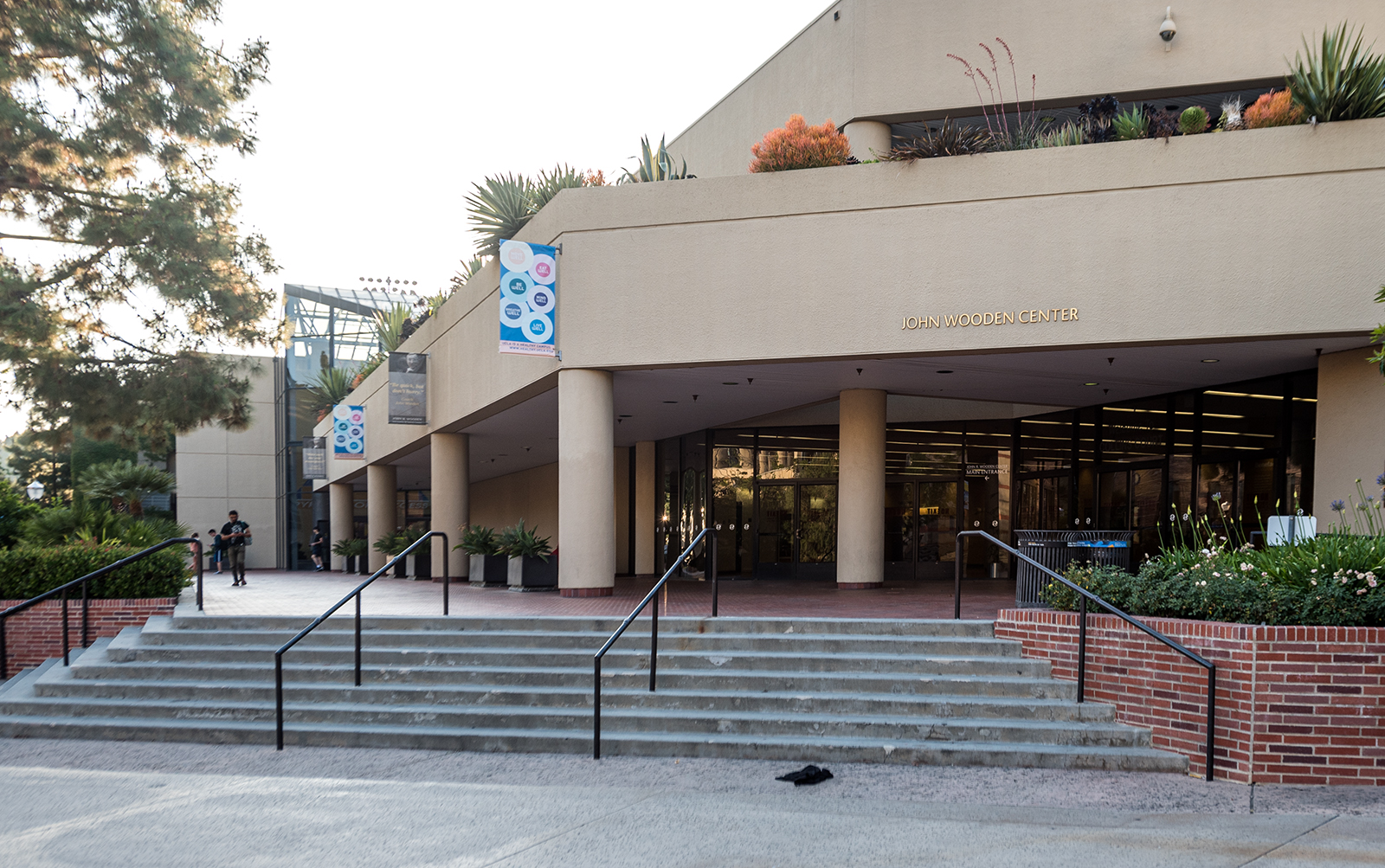John Wooden Center should be used to quickly address student housing insecurity

The John Wooden Center is open 24 hours a day on certain days of the week and has plentiful unused spaces. The on-campus facility could best serve housing-insecure students if bedding and amenities are provided. (Daily Bruin file photo)

By Sabrina Huang
Jan. 23, 2020 9:33 p.m.
They say old habits die hard.
And for a 100-year-old university, the habit of sidestepping student homelessness seems particularly hard to change.
A little over one week into its second century, UCLA rejected the North Westwood Neighborhood Council’s proposal to provide on-campus parking spaces that would allow housing-insecure students to sleep in their cars. Citing such an idea as unsafe and unsanitary, Administrative Vice Chancellor Michael Beck introduced the school’s own plan to tackle student homelessness – a hostel-like space that would cost students $15 per night.
But this facility will not see the light of day until the beginning of next fall quarter – and that’s assuming that the university sticks to its timeline.
While administrators scramble to find solutions that would tackle student homelessness, students who lack access to stable housing are forced to wait months without permanent living arrangements.
A Temple University study found that, as of 2019, housing insecurity continues to ensnare nearly five out of every 10 college students at four-year universities across the nation.
With no foreseeable end to this issue in sight, UCLA must prioritize students experiencing homelessness or housing insecurity by utilizing existing campus facilities to provide an immediate, albeit temporary, housing space. If the school’s administrators just learn to take advantage of the easily accessible resources already offered on campus, housing-insecure students wouldn’t be hung out to dry as a result of bureaucratic red tape.
And that space already exists in the form of the John Wooden Center.
Funded primarily by student fees, the center is currently open 24 hours for three days of the week as a result of the Social Justice Referendum students passed in 2016. The referendum increased students’ quarterly fees by $24.99 and set aside $1.75 of that fee to cover the additional costs of extending the center’s hours.
But as of now, these fees only benefit the small number of students who access the center in the early morning hours.
Jessica Maguire, a fourth-year psychobiology student and John Wooden Center supervisor, said few students use the facility past 12 a.m.
“I feel like (the number of students who come to the John Wooden Center is) not enough to keep a gym open for 24 hours,” Maguire said. “It’s ridiculous.”
Rather than let student fees continue to go to waste, the school should set aside at least one of the conference rooms in the John Wooden Center to support students who need a place to spend the night. This would mean equipping the room with beds and extending the hours of the facility to keep it open for the entire week.
While this would require additional funds, the marginal cost pales in comparison to how much students will soon have to pay to reside in the school’s proposed hostel space.
In other words, it’s safer and more sanitary than sleeping in cars. And if the university is adamant about helping these students, it could reasonably start next week.
Michael Skiles, president of the NWWNC, said the costs of staying in a hostel can easily add up.
“If you multiply ($15 to) $20 a night by 30 days a month, (students would pay) $600 a month to sleep in the hostel, which is not a whole lot less than what students could secure for themselves by subletting someone’s couch or subletting a bunch of bunk beds in a room,” Skiles said.
And while administrators may think $15 is a fair price to charge students for a good night’s sleep, doing so is unreasonable, considering students are already forking over tuition and fees to pay for a facility that can easily serve as a shelter.
Besides providing an enclosed space that students can sleep in and safely lock, the John Wooden Center also has showers, lockers, hygienic supplies and towels that students can readily use.
Even UCLA Recreation seems to agree with the viability of this idea.
“Extensive discussion and planning is currently taking place on how existing spaces within the John Wooden Center can be adapted and furnished to serve housing- insecure students,” said UCLA spokesperson Katherine Alvarado in an emailed statement.
While those good intentions may exist, it’s been almost four years since students first expressed the need to use the John Wooden Center for more than just fitness. And as discussions and plans are being hashed out behind closed doors, housing-insecure students are still left without a place to spend the night.
“There’s kind of a lack of awareness or maybe a lack of resources for people who are facing housing insecurity,” said Abigail Low, a fourth-year psychobiology student and president of the undergraduate director board of Bruin Shelter. “I think it’s really important for people to realize that students go through a lot, and it’s important to help them because in a way we’re investing in the future.”
In other words, the time has passed for discussion and planning.
It cannot go unsaid that some resources exist on campus to help students experiencing homelessness and housing insecurity – they just come with devastating limitations. Although the Economic Crisis Response Team supports students experiencing financial hardships, it provides only 14 days of emergency housing. And the Santa Monica-based Bruin Shelter, which provides housing, food and medical services to college students, has only 10 beds and a waiting list of at least 100 students.
As UCLA embarks on another century as an institution of higher learning, it has a moral obligation to address and tackle student homelessness.
Wasting student fees and ignoring housing insecurity are habits that must be left in the past.

